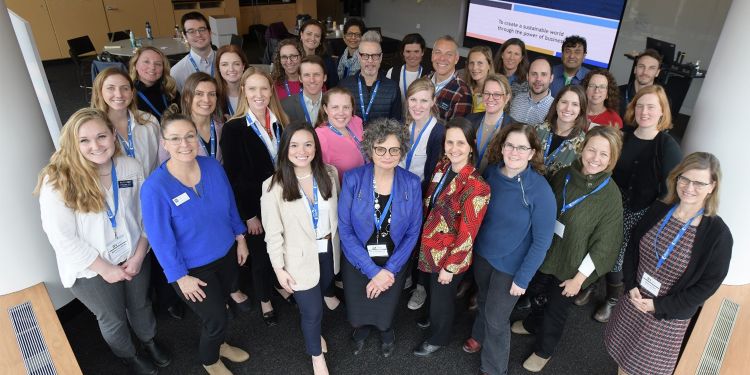In addition to the “wow” factor popping from the sheer volume of climate-smart MBA students from 39 schools at the 2024 ClimateCAP Summit in Ann Arbor this February, the chance to interact with staff and faculty peers from across these programs provides a motivating adrenaline boost and high-value insight to my role leading the Business and Environment Initiative at HBS.
We’re a group labeled as “Educators” at the Summit – center directors, initiative leaders, faculty – who are there not only to learn from our students and the speakers, but to learn from each other in our shared mission of integrating climate and sustainability into the MBA curriculum, career paths, and co-curricular experiences.

The Educator group is collaborative and inspiring. At this year’s Summit, we did a deep dive into the challenges we face in advancing our efforts, as well as our successes in a discussion led by Charlene Zietsma, Faculty Director at Michigan’s Erb Institute (who also kindly invited us to her house for a very fun dinner afterwards). We learned from Kat Baird from Berkeley’s Haas School of Business about the highly useful insights from their survey work on the Sustainability Industry and Careers Skills Analysis, and we learned from other schools about their work to embed climate into the curriculum, case collections, expanding the audience for engagement, and navigating and aligning the needs of different stakeholders. Helpfully, Katie Kross and Jessica Wingert at Duke’s Fuqua School of Business, who lead ClimateCAP and all of its year-round activities, send summaries and insights to keep the Educator group mobilized and working together.
Each school has different operating models and roadblocks as well as levers and entry points. Each school is striving for more integration of climate content into the core. Each school is working to connect employers, students, and career offices to the reality that every job will (and already does) require climate knowledge. Sometimes progress is dependent on raising awareness of teaching materials; sometimes it is finding that open space to fit new teaching materials into a course; sometimes it’s about a new career fair or relationship with a key employer who “gets it”; sometimes it’s about getting the support and leadership from the very top of the institution to say it’s important; sometimes it’s about creating communities among students who aggregate demand at their schools for updated curriculum or more access to events, discussions, and leaders. Really, it’s about all of the above and more.
Working together to share ideas, pain points, and successes is critical. There are several examples of collaboration in addition to ClimateCAP that I have the opportunity to participate in via my role at HBS and that I have found to be highly productive, such as the Network for Business Sustainability, and the Open Climate Curriculum Project, in addition to several 1:1 collaborations that have stemmed from these larger groups. We all compete for the best pool of MBAs. Increasingly, integration of climate and sustainability into the MBA experience is a heavily weighted factor. One could say we’re embarking on a healthy model of coopetition and it’s how we all get better. At the baseline, we’re modelling collaboration.
Such collaboration doesn’t have to be limited to the educator community. It extends to the management community and the finance community, as the corporate world works together to tackle the climate crisis.
Not only is it more productive to share ideas and collaborate, but, frankly, it just makes our jobs so much more fun.

